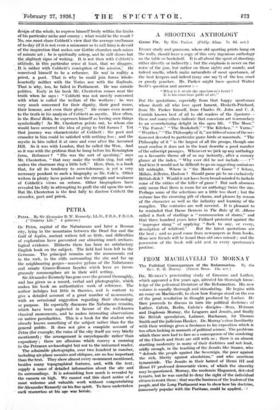FROM MACHIAVELLI TO MORNA Y
The Political Consequences of the Reformation. By the Rev. R. H. Murray. (Ernest liel1R. 15s.- net.) - Di. MURRAY'S penetrating study of Erasmus and Luther, which appeared a few years ago, attested his thorough know- ledge of the polemical literature of the Reformation. His new volume is equally thorough and 'stimulating. He begins with an essay on Machiavelli, to show how Europe stood on the eve of the great revolution in thought produced by Luther. He their proceeds to discuss in turn the political doctrines of Luther, Calvin, Bodin, Calvin's disciples—Beza, Hotman and Duplessis Mornay, the Leaguers and Jesuits, and finally the British speculators, Latimer, Buchanan, Sir Thomas Smith and the judicious Hooker. Dr. Murray's close familiarity with their writings gives a freshness to his exposition which is too often lacking in manuals of political science. The problems which these men had to face as a consequence. of the sundering of the Church and State are still with us ; there is an almost startling modernity in many of their doctrines and not least, oddly enough, in the teaching of the Jesuits like Suarez, who 4` defends the people against the Sovereign, the poor against the rich, liberty against absolutism," and who sanctions tyrannicide. The Jesuits in their hatred of Henri HI and Henri W professed democratic views, of which the sincerity may be questioned. Mornay, the moderate Huguenot, detested tyrants, but he was careful to deny the right of the individual citizen to resist them ; that was the business of the leaders of the people, and the Long Parliament was to show how his doctrine, immensely popular with the Puritans, could be applied.






















































 Previous page
Previous page